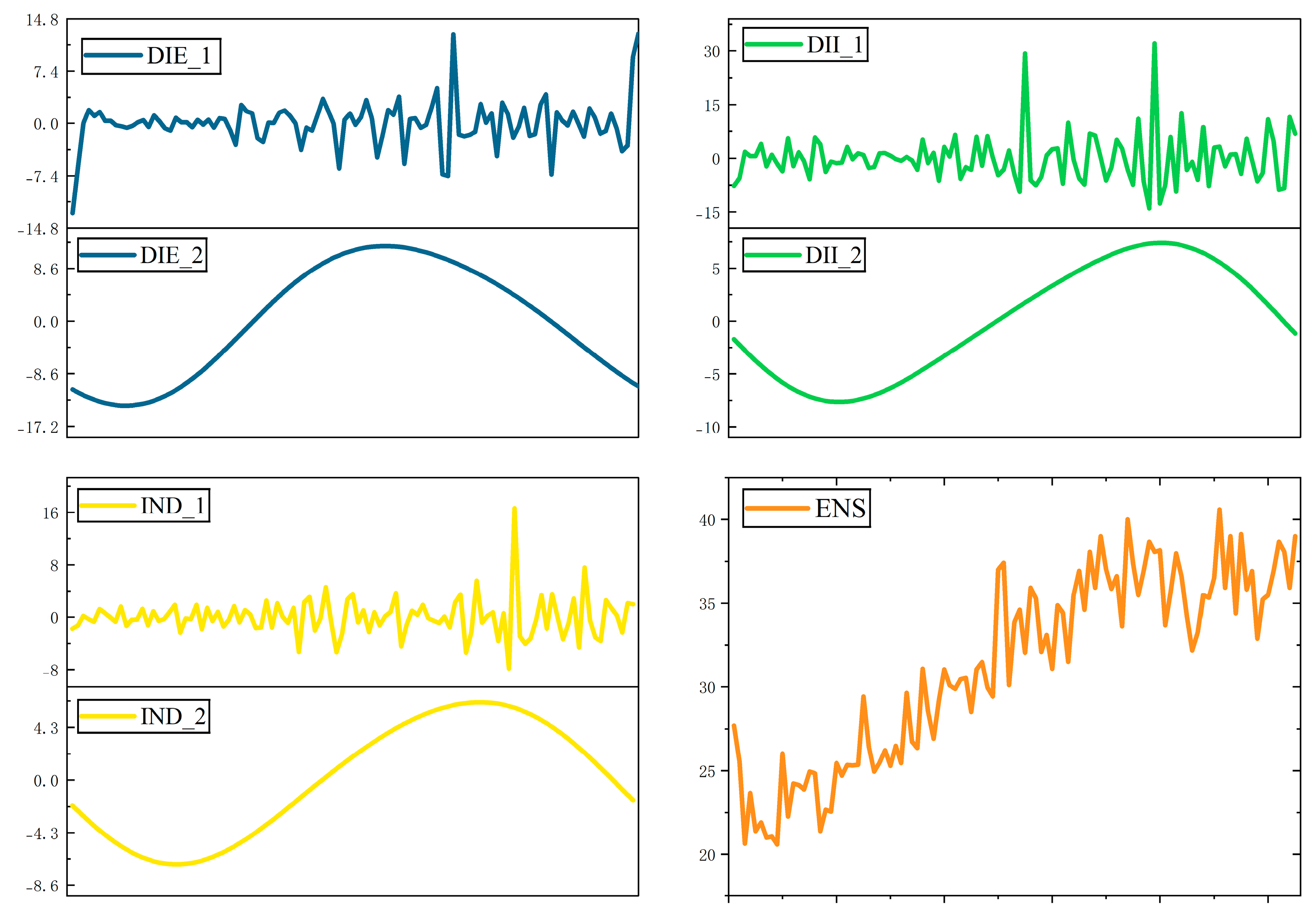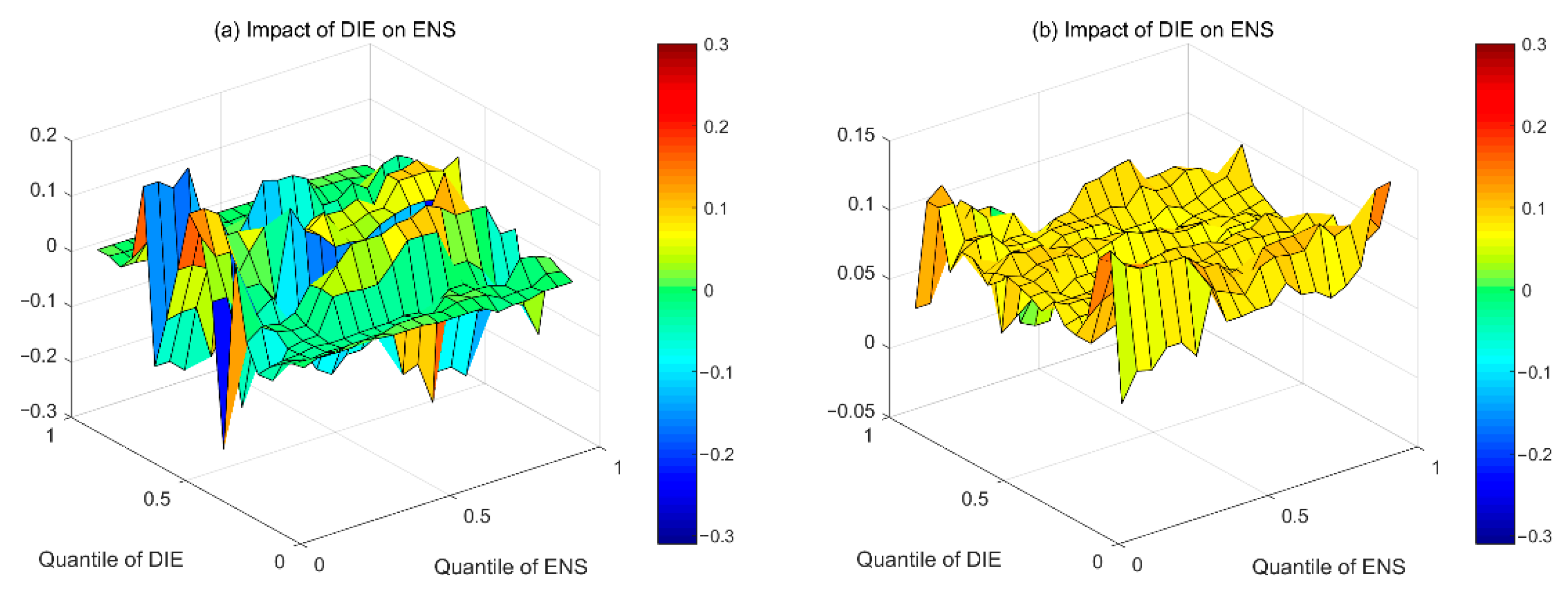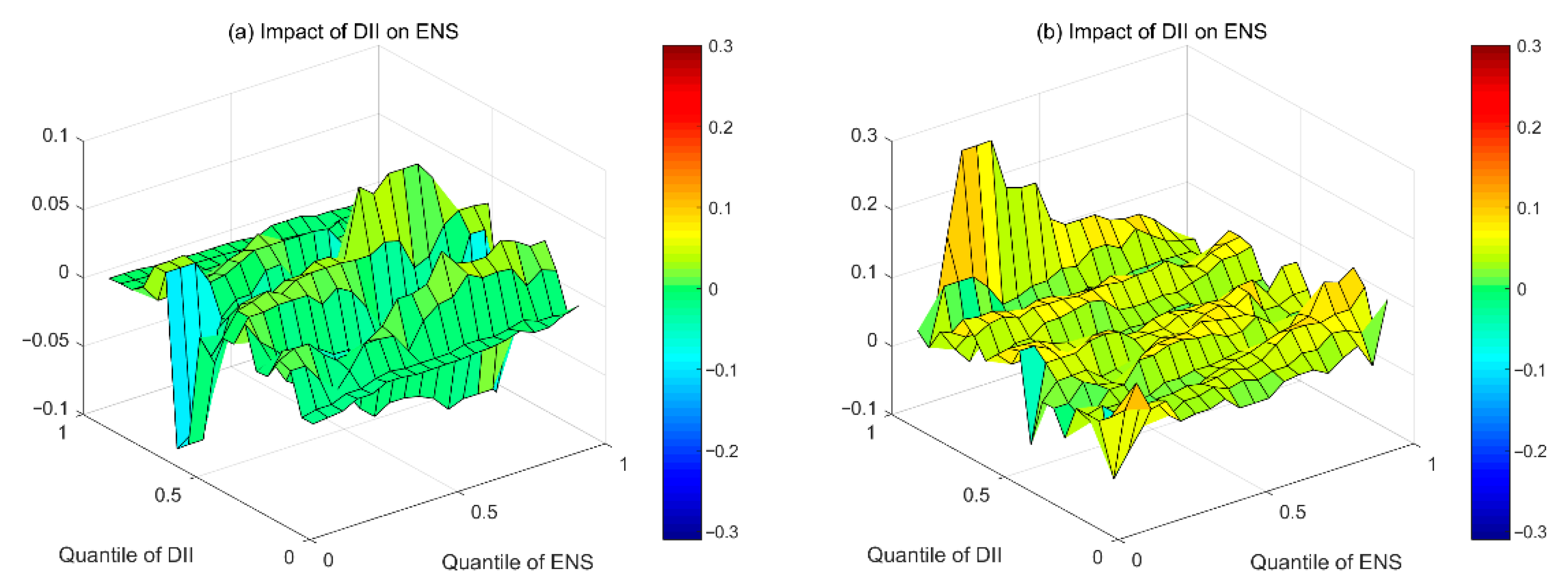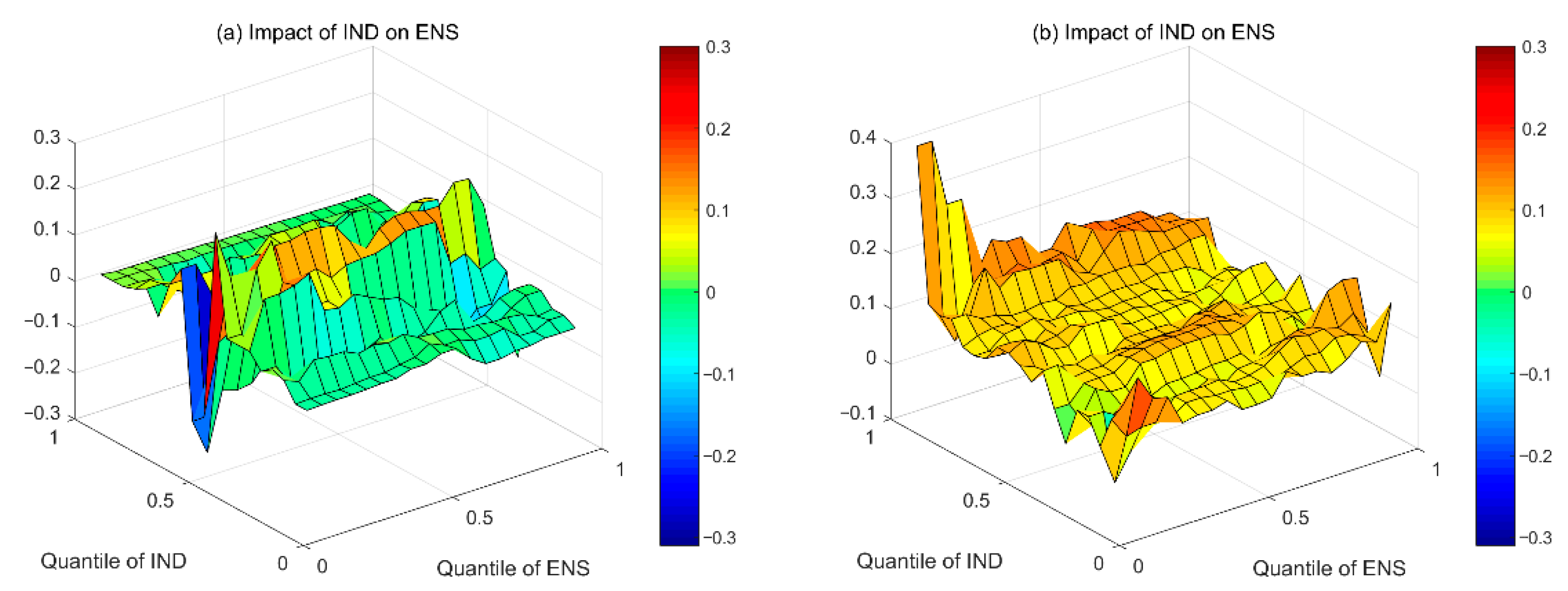The Criticality of the Digital Economy in Environmental Sustainability: Fresh Insights from a Wavelet-Based Quantile-on-Quantile Approach
Abstract
1. Introduction
2. Literature Review
3. Wavelet-Based Quantile on Quantile Regression Method
3.1. Wavelet Decomposition Method
3.2. Quantile-on-Quantile Regression
4. Data and Empirical Results
4.1. Data Source and Description
4.2. Quantile-on-Quantile Results
4.3. Robust Test
5. Conclusions and Policy Implications
Author Contributions
Funding
Data Availability Statement
Conflicts of Interest
References
- Ford, S.; Despeisse, M. Additive manufacturing and sustainability: An exploratory study of the advantages and challenges. J. Clean. Prod. 2016, 137, 1573–1587. [Google Scholar] [CrossRef]
- Hung, N.T. Green investment, financial development, digitalization and economic sustainability in Vietnam: Evidence from a quantile-on-quantile regression and wavelet coherence. Technol. Forecast. Soc. Chang. 2023, 186, 122185. [Google Scholar] [CrossRef]
- Lee, C.C.; Lou, R.; Wang, F. Digital financial inclusion and poverty alleviation: Evidence from the sustainable development of China. Econ. Anal. Policy 2023, 77, 418–434. [Google Scholar] [CrossRef]
- Qiu, H.; Yang, B.; Liu, Y.; Wang, L. Emissions Reduction Effects and Carbon Leakage Risks of Carbon Emissions Trading Policy: An Empirical Study Based on the Spatial Durbin Model. Sustainability 2024, 16, 9544. [Google Scholar] [CrossRef]
- Taghvaee, V.M.; Arani, A.A.; Agheli, L. Sustainable development spillover effects between North America and MENA: Analyzing the integrated sustainability perspective. Environ. Sustain. Indic. 2022, 14, 100182. [Google Scholar]
- Su, C.W.; Liu, F.; Stefea, P.; Umar, M. Does technology innovation help to achieve carbon neutrality? Econ. Anal. Policy 2023, 78, 1–14. [Google Scholar] [CrossRef]
- Brenner, B.; Hartl, B. The perceived relationship between digitalization and ecological, economic, and social sustainability. J. Clean. Prod. 2021, 315, 128128. [Google Scholar] [CrossRef]
- Farooq, U.; Alam, M.M.; Subhani, B.H.; Tabash, M.I.; Shamansurova, Z. Non-Linear Effects of Economic Policy Uncertainty on Green Innovation: Evidence from BRICS Countries. Sustainability 2024, 16, 9529. [Google Scholar] [CrossRef]
- Yang, Z.; Gao, W.; Han, Q.; Qi, L.; Cui, Y.; Chen, Y. Digitalization and carbon emissions: How does digital city construction affect China’s carbon emission reduction? Sustain. Cities Soc. 2022, 87, 104201. [Google Scholar] [CrossRef]
- Liu, B.; Wang, Y.; Jiang, N.; Zhang, X. The impact of Digital Industrialization and Industrial Digitalization on Regional Green Innovation Efficiency in China-From the Perspective of the Innovation Value Chain. J. Clean. Prod. 2024, 478, 144015. [Google Scholar] [CrossRef]
- Filipiak, B.Z.; Dylewski, M.; Kalinowski, M. Economic development trends in the EU tourism industry. Towards the digitalization process and sustainability. Qual. Quant. 2020, 57, 321–346. [Google Scholar] [CrossRef] [PubMed]
- Omri, A. Technological innovation and sustainable development: Does the stage of development matter? Environ. Impact Assess. Rev. 2020, 83, 106398. [Google Scholar] [CrossRef]
- Ma, R.; Lin, B. Digitalization and energy-saving and emission reduction in Chinese cities: Synergy between industrialization and digitalization. Appl. Energy 2023, 345, 121308. [Google Scholar] [CrossRef]
- Su, C.W.; Wang, X.Q.; Zhu, H.; Tao, R.; Moldovan, N.C.; Lobonţ, O.R. Testing for multiple bubbles in the copper price: Periodically collapsing behavior. Resour. Policy 2020, 65, 101587. [Google Scholar] [CrossRef] [PubMed]
- Hosan, S.; Karmaker, S.C.; Rahman, M.M.; Chapman, A.J.; Saha, B.B. Dynamic links among the demographic dividend, digitalization, energy intensity and sustainable economic growth: Empirical evidence from emerging economies. J. Clean. Prod. 2022, 330, 129858. [Google Scholar] [CrossRef]
- Gijzen, H. Big data for a sustainable future. Nature 2013, 502, 38. [Google Scholar] [CrossRef]
- Lange, S.; Pohl, J.; Santarius, T. Digitalization and energy consumption. Does ICT reduce energy demand? Ecol. Econ. 2020, 176, 106760. [Google Scholar] [CrossRef]
- Ribeiro-Navarrete, S.; Botella-Carrubi, D.; Palacios-Marqués, D.; Orero-Blat, M. The effect of digitalization on business performance: An applied study of KIBS. J. Bus. Res. 2021, 126, 319–326. [Google Scholar] [CrossRef]
- Ma, D.; Zhu, Q. Innovation in emerging economies: Research on the digital economy driving high-quality green development. J. Bus. Res. 2022, 145, 801–813. [Google Scholar] [CrossRef]
- Wang, X.Q.; Su, C.W.; Lobonţ, O.R.; Li, H.; Nicoleta-Claudia, M. Is China’s carbon trading market efficient? Evidence from emissions trading scheme pilots. Energy 2022, 245, 123240. [Google Scholar] [CrossRef]
- Shen, X.; Wang, Z. Can digital industrialization promote energy conservation development in China? Empirical evidence based on national big data comprehensive pilot zone policy. J. Environ. Manag. 2024, 368, 122125. [Google Scholar] [CrossRef]
- Matthess, M.; Kunkel, S. Structural change and digitalization in developing countries: Conceptually linking the two transformations. Technol. Soc. 2020, 63, 101428. [Google Scholar] [CrossRef]
- Wang, X.; Qin, C.; Liu, Y.; Tanasescu, C.; Bao, J. Emerging enablers of green low-carbon development: Do digital economy and open innovation matter? Energy Econ. 2023, 127, 107065. [Google Scholar] [CrossRef]
- Ghobakhloo, M. Industry 4.0, digitization, and opportunities for sustainability. J. Clean. Prod. 2020, 252, 119869. [Google Scholar] [CrossRef]
- Shabani, Z.D.; Shahnazi, R. Energy consumption, carbon dioxide emissions, information and communications technology, and gross domestic product in Iranian economic sectors: A panel causality analysis. Energy 2019, 169, 1064–1078. [Google Scholar] [CrossRef]
- Wang, X.; Sun, X.; Oprean-Stan, C.; Chang, T. What role does global value chain participation play in emissions embodied in trade? New evidence from value-added trade. Econ. Anal. Policy 2023, 80, 1205–1223. [Google Scholar] [CrossRef]
- Zhang, Q.; Wu, P.; Li, R.; Chen, A. Digital transformation and economic growth Efficiency improvement in the Digital media era: Digitalization of industry or Digital industrialization? Int. Rev. Econ. Financ. 2024, 92, 667–677. [Google Scholar] [CrossRef]
- Seele, P.; Lock, I. The game-changing potential of digitalization for sustainability: Possibilities, perils, and pathways. Sustain. Sci. 2017, 12, 183–185. [Google Scholar] [CrossRef]
- Sama, L.M.; Stefanidis, A.; Casselman, R.M. Rethinking corporate governance in the digital economy: The role of stewardship. Bus. Horiz. 2022, 65, 535–546. [Google Scholar] [CrossRef]
- Gencay, R.; Selcuk, F.; Whitcher, B. An Introduction to Wavelets and Other Filtering Methods in Finance and Economics; Academic Press: San Diego, CA, USA, 2002. [Google Scholar]
- Sim, N.; Zhou, H. Oil prices, US stock return, and the dependence between their quantiles. J. Bank. Financ. 2015, 55, 1–8. [Google Scholar] [CrossRef]
- Su, C.W.; Yuan, X.; Umar, M.; Lobonţ, O.R. Does technological innovation bring destruction or creation to the labor market? Technol. Soc. 2022, 68, 101905. [Google Scholar] [CrossRef]
- Lee, C.C.; He, Z.W.; Xiao, F. How does information and communication technology affect renewable energy technology innovation? Int. Evid. Renew. Energy 2022, 200, 546–557. [Google Scholar] [CrossRef]
- Teece, D.J. Profiting from innovation in the digital economy: Enabling technologies, standards, and licensing models in the wireless world. Res. Policy 2018, 47, 1367–1387. [Google Scholar] [CrossRef]
- Wang, X.; Wu, T.; Zhong, H.; Su, C.W. Bubble behaviors in nickel price: What roles do geopolitical risk and speculation play? Resour. Policy 2023, 83, 103707. [Google Scholar] [CrossRef]
- Arshad, Z.; Madaleno, M.; Lillebø, A.I.; Vieira, H. Digitalization’s contribution towards sustainable development and climate change mitigation: An empirical evidence from EU economies. Heliyon 2024, 10, e33451. [Google Scholar] [CrossRef]
- He, D.; Deng, X.; Gao, Y.; Wang, X. How does digitalization affect carbon emissions in animal husbandry? A new evidence from China. Resour. Conserv. Recycl. 2025, 214, 108040. [Google Scholar] [CrossRef]
- Guo, B.; Yu, H.; Jin, G. Urban green total factor productivity in China: A generalized Luenberger productivity indicator and its parametric decomposition. Sustain. Cities Soc. 2024, 106, 105365. [Google Scholar] [CrossRef]
- Lee, C.C.; Wang, C.S. Financial development, technological innovation and energy security: Evidence from Chinese provincial experience. Energy Econ. 2022, 112, 106161. [Google Scholar] [CrossRef]
- Sorescu, A.; Schreier, M. Innovation in the digital economy: A broader view of its scope, antecedents, and consequences. J. Acad. Mark. Sci. 2021, 49, 627–631. [Google Scholar] [CrossRef]
- Yi, S.; Xiao-li, A. Application of threshold regression analysis to study the impact of regional technological innovation level on sustainable development. Renew. Sustain. Energy Rev. 2018, 89, 27–32. [Google Scholar] [CrossRef]
- Ahmed, Z.; Nathaniel, S.P.; Shahbaz, M. The criticality of information and communication technology and human capital in environmental sustainability: Evidence from Latin American and Caribbean countries. J. Clean. Prod. 2021, 286, 125529. [Google Scholar] [CrossRef]
- Chen, X.; Gong, X.; Li, D.; Zhang, J. Can information and communication technology reduce CO2 emission? A quantile regression analysis. Environ. Sci. Pollut. Res. 2019, 26, 32977–32992. [Google Scholar] [CrossRef] [PubMed]
- Park, Y.; Meng, F.; Baloch, M.A. The effect of ICT, financial development, growth, and trade openness on CO2 emissions: An empirical analysis. Environ. Sci. Pollut. Res. 2018, 25, 30708–30719. [Google Scholar] [CrossRef] [PubMed]
- Wang, X.Q.; Jin, W.X.; Qin, M.; Su, C.W.; Umar, M. Pushing Forward the Deployment of Renewable Energy: Do Cross-National Spillovers of Policy Instruments Matter? Energy 2024, 301, 131643. [Google Scholar] [CrossRef]
- Haftu, G.G. Information communications technology and economic growth in Sub-Saharan Africa: A panel data approach. Telecommun. Policy 2019, 43, 88–99. [Google Scholar] [CrossRef]
- Charfeddine, L.; Umlai, M. ICT sector, digitization and environmental sustainability: A systematic review of the literature from 2000 to 2022. Renew. Sustain. Energy Rev. 2023, 184, 113482. [Google Scholar] [CrossRef]
- Husaini, D.H.; Lean, H.H. Digitalization and energy sustainability in ASEAN. Resour. Conserv. Recycl. 2022, 184, 106377. [Google Scholar] [CrossRef]
- Xu, Y.; Xu, L. The convergence between digital industrialization and industrial digitalization and export technology complexity: Evidence from China. Sustainability 2023, 15, 9081. [Google Scholar] [CrossRef]
- Choi, D.S.; Youn, J.S.; Lee, I.H.; Choi, B.J.; Jeon, K.J. Considering condensable particulate matter emissions improves the accuracy of air quality modeling for environmental impact assessment. Sustainability 2021, 13, 4470. [Google Scholar] [CrossRef]
- Amin, S.; Khan, M.A.; Mehmood, W. Probing environmental sustainability through the diversity-pollution nexus—A global perspective via PM2.5 and NO2. Water Air Soil Pollut. 2022, 233, 58. [Google Scholar] [CrossRef]





| ENS | |||||||
|---|---|---|---|---|---|---|---|
| Median | 0.127 | 0.657 | −0.538 | 0.089 | −0.210 | 0.235 | 32.054 |
| Maximum | 12.723 | 12.290 | 32.053 | 7.412 | 16.659 | 6.352 | 40.601 |
| Minimum | −12.696 | −13.816 | −14.052 | −7.637 | −7.816 | −6.893 | 20.585 |
| Std. dev. | 3.331 | 9.214 | 6.815 | 5.241 | 2.916 | 4.690 | 5.614 |
| Skewness | 0.268 | −0.130 | 1.687 | −0.038 | 1.644 | −0.089 | −0.289 |
| Kurtosis | 7.971 | 1.527 | 9.113 | 1.543 | 12.262 | 1.515 | 1.822 |
| Jarque-Bera | 109.353 *** | 9.787 *** | 213.336 *** | 9.310 *** | 422.604 *** | 9.790 *** | 7.534 ** |
Disclaimer/Publisher’s Note: The statements, opinions and data contained in all publications are solely those of the individual author(s) and contributor(s) and not of MDPI and/or the editor(s). MDPI and/or the editor(s) disclaim responsibility for any injury to people or property resulting from any ideas, methods, instructions or products referred to in the content. |
© 2025 by the authors. Licensee MDPI, Basel, Switzerland. This article is an open access article distributed under the terms and conditions of the Creative Commons Attribution (CC BY) license (https://creativecommons.org/licenses/by/4.0/).
Share and Cite
Wong, X.; Kang, W.; Kim, J.; Xu, Y.; Wang, A. The Criticality of the Digital Economy in Environmental Sustainability: Fresh Insights from a Wavelet-Based Quantile-on-Quantile Approach. Sustainability 2025, 17, 622. https://doi.org/10.3390/su17020622
Wong X, Kang W, Kim J, Xu Y, Wang A. The Criticality of the Digital Economy in Environmental Sustainability: Fresh Insights from a Wavelet-Based Quantile-on-Quantile Approach. Sustainability. 2025; 17(2):622. https://doi.org/10.3390/su17020622
Chicago/Turabian StyleWong, Xiaoqing, Wenhao Kang, Jisu Kim, Yingying Xu, and Ankang Wang. 2025. "The Criticality of the Digital Economy in Environmental Sustainability: Fresh Insights from a Wavelet-Based Quantile-on-Quantile Approach" Sustainability 17, no. 2: 622. https://doi.org/10.3390/su17020622
APA StyleWong, X., Kang, W., Kim, J., Xu, Y., & Wang, A. (2025). The Criticality of the Digital Economy in Environmental Sustainability: Fresh Insights from a Wavelet-Based Quantile-on-Quantile Approach. Sustainability, 17(2), 622. https://doi.org/10.3390/su17020622






